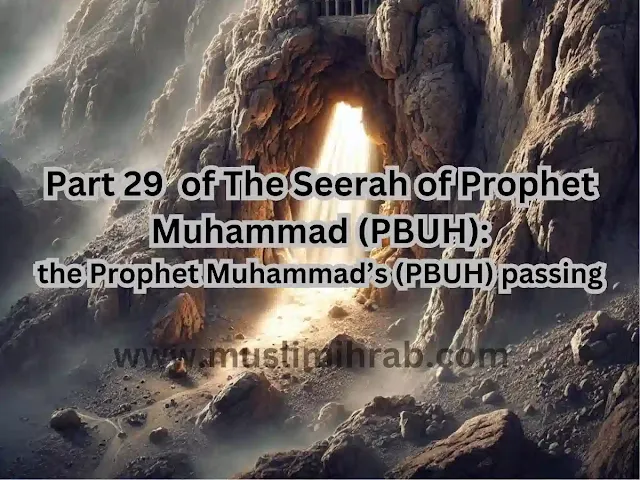The news of the Prophet’s death spread swiftly, and the companions were struck with grief. In Madinah, disbelief and sorrow gripped the hearts of the believers. Some could not accept the reality of the moment. Umar ibn al-Khattab (RA), in his anguish, declared that the Prophet (PBUH) had not died and would return.
In this moment of confusion and heartbreak, Abu Bakr (RA) emerged as a source of calm and clarity. He approached the home of Aisha (RA), where the Prophet’s body lay, uncovered his blessed face, and kissed him. With tears in his eyes, Abu Bakr (RA) said, “You were beautiful in life, and you are beautiful in death.”
Abu Bakr then addressed the grieving Muslims in the mosque. He reminded them of a truth that anchored their faith, reciting from the Quran:
"Muhammad is no more than a messenger; many messengers have passed away before him. If he dies or is slain, will you then turn back on your heels?" (Surah Aal-E-Imran, 3:144).
These words brought a sobering clarity to the companions. The Prophet (PBUH) had fulfilled his mission, and their duty was to carry on his teachings.
The next challenge was selecting a leader to guide the Ummah. The companions gathered at Saqifah Banu Sa’idah, where discussions were held. After much deliberation, Abu Bakr (RA) was chosen as the first Caliph of Islam. This decision was significant, as it marked the beginning of the Caliphate, ensuring the continuity of leadership and the preservation of the Prophet’s legacy.
Abu Bakr (RA), in his inaugural address, acknowledged the weight of this responsibility. He humbly stated that he was not the best among them but would strive to fulfill the role to the best of his ability. He emphasized obedience to Allah and His Messenger, setting a precedent for leadership rooted in humility and adherence to Islamic principles.
The funeral of the Prophet (PBUH) was a moment of collective mourning and reflection. His body was prepared for burial with utmost care and reverence. In line with his wishes, the Prophet (PBUH) was buried in the chamber of Aisha (RA), the place where he had spent his final days. The burial took place without the formalities of worldly leadership, highlighting the simplicity and humility that defined his life.
Despite the grief, the companions quickly turned their attention to the tasks at hand. The Prophet (PBUH) had left behind a growing community and a clear message, but the challenges were immense. The tribes that had once pledged allegiance to Islam began showing signs of rebellion. Some sought to abandon their faith, while others refused to pay the zakat, claiming it was a personal obligation to the Prophet (PBUH) alone.
Abu Bakr (RA) stood firm against these challenges. He reminded the Muslims of their covenant with Allah and emphasized that Islam was not tied to the life of one man but was a universal and eternal truth. Through his determination and resolve, Abu Bakr (RA) unified the Ummah, ensuring the stability of the Muslim community during this critical period.
The companions, though grieving, found solace in the Quran and Sunnah. They understood that their beloved Prophet (PBUH) had left them with everything they needed to continue their journey. The Quran remained their guide, and the Prophet’s (PBUH) teachings provided a framework for every aspect of life.
The passing of the Prophet Muhammad (PBUH) marked the end of an era but not the end of his influence. His legacy lived on through the companions, who carried his message to the farthest corners of the world. His life remains a source of inspiration, a beacon of light for those seeking to walk the path of righteousness.
For the Muslims of that time and for generations to come, the Prophet’s (PBUH) passing was a reminder of the transient nature of life and the eternal nature of Allah’s message. It was a call to action, urging them to uphold the values of justice, mercy, and devotion that he had exemplified.


